Gull Roof Nesting: What to Know & Do
Apr 20, 2020Wild Goose Chase has managed urban populations of gulls for over 20 years. In that time, we have seen major increases of gulls utilizing business rooftops for nesting sites. The flat, high areas appeal to nesting gulls because they are safe from ground predators.
Gulls get very aggressive around their nests and young and that can make roof encounters dangerous. Droppings are messy, disgusting, and create health risks, and reduce roof lifespan. Here’s what you should know about gull roof nesting and how to deal with it.
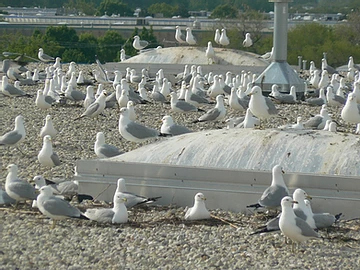
Gull Chicks
If roof nests are not treated, more issues arise. Once the chicks hatch, the parents become even more aggressive. They will not only attack humans on the roof, but also nearby on the ground. They will even attack the chicks of other gulls that come too near their chick. To top that off, they start bringing food up for their chicks. This often includes trash and chicken with the bones still inside. Once the meat is eaten, the bones and trash can clog up roof drains. Once the chicks become more mobile, but before they can fly, the bullying by other gulls gets more intense and the young gulls start jumping off of the roof. This leads to gulls getting injured or killed.
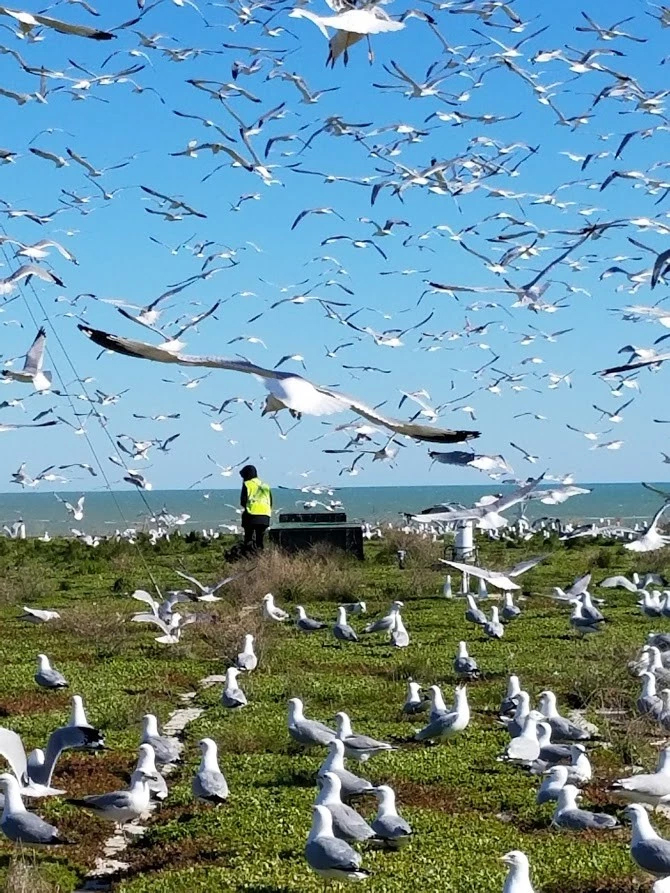
Signs of Gull Nesting
Gull nesting season generally begins in mid-April and goes through late June or July and roof nesting is most common if you have a flat roof. We have seen roof nests over 8 stories above the ground. It’s important to know whether gulls may be setting up shop to nest up on your roof so that you can manage them safely and humanely. Treating nests is very time sensitive so, if you see the following, you may have roof nesting:
Flock of Gulls Visible on RooftopGulls are colony nesters, sometimes with flocks as low as 20 or 30, but sometimes numbering in the thousands! Flocks circling and loafing on your roof or around your building is a sign that they are staking a nesting claim.
Droppings on RooftopThis is a good sign that gulls are frequenting your rooftop, even if you don’t regularly see them up there. Gull droppings are very acidic and can contain a number of dangerous bacteria, parasites, and viruses. Because many HVAC systems are on the roof, this can create a human health risk!
Nesting Behavior Occurring (NBO)NBO includes gulls mating, attacking each other, attacking their reflections, attacking cars pets or people, and hanging around entrances and not wanting to move or leave. Gulls are very aggressive and this can create a safety liability risk for your property. If you’re seeing this behavior, there’s a good chance that nesting will be occurring!
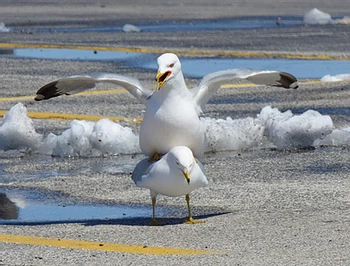
Safety
If you do have aggressive gulls nesting on your roof, it’s important that you are safe when checking out the situation. Gulls can be extremely aggressive when defending their nest. Here’s how to keep safe:
- Know Where to Go: note where gulls have been sighted from the ground in relation to the roof access point
- Wear a Hard Hat & Bring an Umbrella: gulls tend to aim for the head and can use their droppings as ammo!
- Open the Hatch Slowly: gulls will usually fly away at your approach, but they also stoop (dive bomb) threats to their nests
- Be Aware of Your Surroundings: since gulls usually attack from the air, it’s easy to panic and fall or get knocked over, so stay at least 10 feet away from the roof edge!
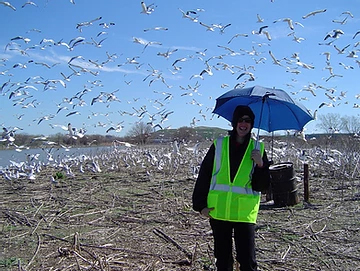
Definite Signs of Gull Nesting
If you notice some of the above signs and think you may have a nest on your roof, here’s what to look for before you call in the professionals. Have binoculars handy to help you see the signs below.
Piles of Sticks, Leaves, Grass & Other DebrisGulls bring a variety of materials up to their nests, but they will also happily use materials that are already there. They will make piles of vegetation and mud and form their nest out of that.
Gull EggsGulls usually lay 3 eggs per clutch, which are grey and mottled and about the size of a ping pong ball. By comparison, goose eggs are white and large, about the size of a pear. Duck eggs are plain and often have a light blue or green tint to them. Both geese and ducks sometimes nest on rooftops!
Aggressive Adult GullsIf you approach an area on your roof and gulls start dive bombing you, there’s a very good chance they have a nest nearby!
What to Do if You Have Gull Nesting
If you observed something on the list above happening on your roof, here’s what you should do:
Call the Professionals!Remember: gulls and their nests are protected so it’s illegal to tamper with them if you don’t have a license and a permit. Contact us so we can help you with your roof nesting issue!
Sign Your ContractThis is part of how we obtain our permit to legally perform the work. We can’t take care of the nest without a signed contract. Remember, treating nests is time-sensitive and we want to humanely manage them as soon as possible!
Note Possible Roof Nesting LocationsWe will search the whole roof, but knowing where potentially aggressive gulls may have a nest will help us be prepared and stay safe!
Warn Roof Maintenance WorkersMake sure anyone going up onto your roof is aware that there may be an aggressive nesting gull!
Provide Roof AccessYou can either escort our team or send us information on how to access the roof in the absence of an escort.
Continued vigilanceWe will need to recheck the area every 2-3 weeks during the nesting season. If you are having an issue between those times, let us know so we can make an extra stop.
After Gull Nesting Season
Once nesting season is over, there are a few steps to take:
Clean up DebrisRemove tempting nesting material like leaves, grass, sticks, and other debris will help keep a clean and healthy roof. This is a service we can provide.
Plan for Next YearNow that you have confirmed that your property has roof nesting, it’s important to make sure that you’re ready to manage this in the coming years. Gulls will attempt to nest in the same area year after year. We offer multi-year contracts to make managing your roof nesting gulls easier for you.
Expand Gull Management ServicesAfter nesting season is a good time to evaluate whether additional gull management services are right for your property. Continual management will help reduce mess and liability for health and human safety issues that occur with having populations of gulls residing on your property. Ask us what we can offer for you including structural deterrents, laser bird harassment, or rooftop dog service.
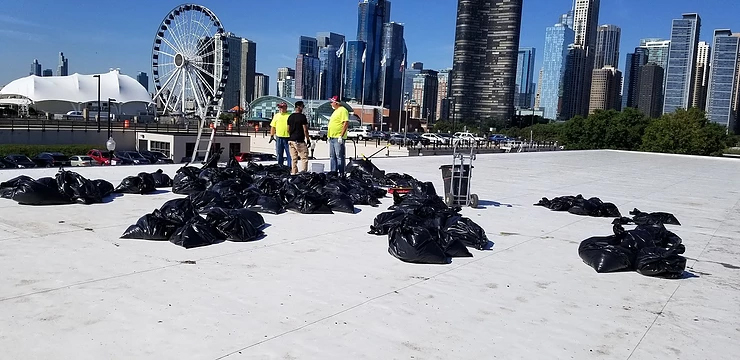




 0
0
